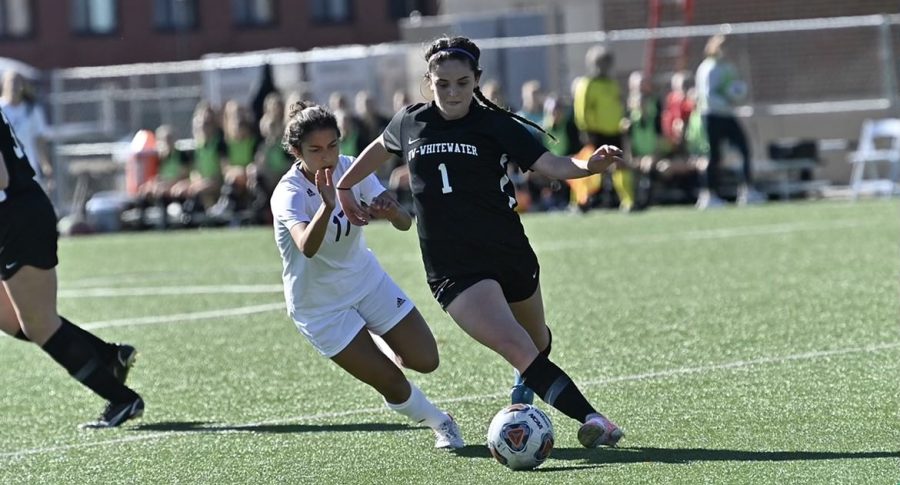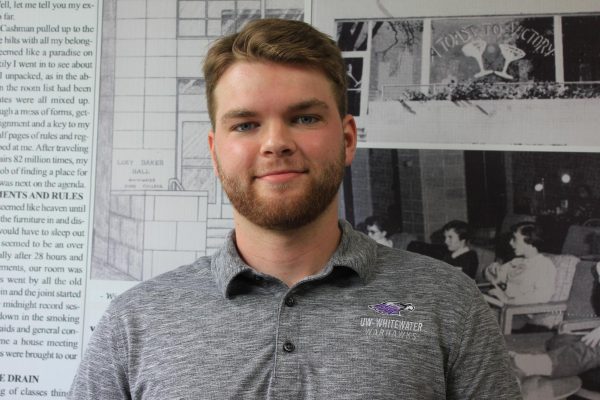Tapping the peak performance of a college athlete
February 12, 2023
College athletics provide a number of physical, and emotional health benefits, but there are also threats to the health of athletes participating. It is common for athletes to suffer one or multiple injuries through their athletic career, but what can they do to avoid it?
The University of Wisconsin-Whitewater athletics program encourages their student-athletes to adopt good habits when it comes to their health. Whether it is their diets, sleep schedules or workout plans, the Warhawk coaching staffs and athletic training staffs are always offering advice on how athletes can stay at peak performance.
Warhawks women’s soccer coach Ryan Quamme has turned to technology to track the physical performance of his athletes during practice and games. The program is in its fourth year of using GPS and heart rate monitors to track several practice variables, such as total distance, heart rate range, and number of total high intensity sprints.
“I have used technology to get to a point where the athletes’ activity is measurable and we aren’t just going off our hunch,” Quamme said.
The workload technology gathers data from the athlete’s workout and creates a total workload score based on the intensity of the practice and how it affected the athlete physically. With this score the coaches are able to collaborate with Whitewater’s athletic trainer, Steve Hillmer, to design practices, compare practice scores to gameday scores and see how athletes perform differently with different workload plans.
“It helps us determine what the level of intensity should be throughout the week to achieve their greatest physical performance on gameday,” Hillmer said.
Despite usage of advanced technology to help keep Warhawk athletes healthy, it is the basics that still pose the biggest threat to an athlete’s health. While navigating a busy college schedule it can be easy for an athlete to not practice good habits with nutrition, hydration and rest.
As a result of rapid growth in the weight-lifting industry, an influx of different workout supplements and products have hit the market and some have made their way into college athletics. Although some of these supplements may be helpful, if an athlete is not maintaining good nutrition, hydration and rest habits, workout supplements are basically useless, Hillmer said.
“It is just important for us to have specific conversations with them about what it is they want to get out of their workout plan and supplement use, and how that fits into their current lifestyle and training program,” Hillmer said.
Communication is a huge factor in the process of keeping a student-athlete healthy and much of that responsibility lands on the athlete themselves.
“We can provide a lot of resources for a lot of things,” Quamme said. “But at the end of the day, even with all of those resources, you need to be true to yourself as a student-athlete to benefit from them.”
Hillmer reiterated the importance of an athlete being honest with themselves and the training staff. A lot of different pressures can keep an athlete from alerting the staff of a potential injury, whether it is pressure from a coach or teammate or the fear of not being able to play. According to Hillmer, if an athlete feels something they should say something.
“Just because you come to the athletic training room doesn’t mean you won’t participate in practice or play in a game,” Hillmer said. “There are a lot of things we can do early to prevent an issue from getting worse.”
One of the more common injuries in college athletes is concussions. In recent years there has been quite a bit of research done, but they still remain as one of the trickiest injuries for coaches, trainers and athletes to tackle.
“The long term effects have been proven, and they are real,” Hillmer said. “It is a question I get a lot, because there aren’t really any objective tests yet, but they are certainly real.”
As time goes on, athletic training specialists and athletic programs are learning more about the key factors involved in keeping college athletes healthy. As athletes themselves become more educated and build relationships with training staff members, they are able to take more responsibility in taking care of their bodies.
Whitewater is always working to determine what they can do to improve and give their athletes the best and safest athletic experience possible.














